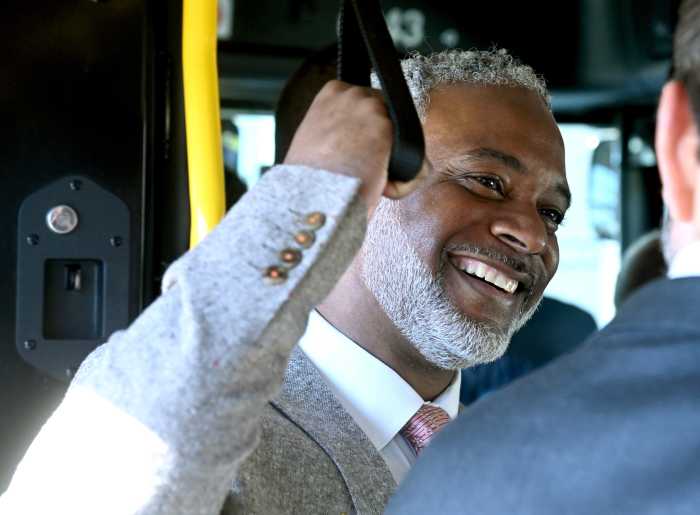After more than four years of litigation, Gavin Grimm has finally won a favorable ruling on the merits of his transgender rights lawsuit against the Gloucester County School Board in Virginia.
On August 9, US District Judge Arenda L. Wright Allen granted Grimm’s motion for summary judgment, finding that the school district violated his rights under Title IX of the 1972 federal education law and the 14th Amendment’s Equal Protection Clause by refusing to let the transgender boy use the boys’ restroom facilities when he was attending Gloucester High School and by refusing to update his official school transcript to conform to the “male” designation on his amended birth certificate.
In addition to awarding Grimm a symbolic damage recovery of $1, the court ordered the district to update Grimm’s official records and provide them to him by August 19. Judge Wright Allen also ordered that the district pay Grimm’s reasonable costs and attorneys’ fees in an amount to be determined. Given the length and complexity of this lawsuit, the fee award is likely to be substantial.
Grimm began his freshman year at Gloucester High School in 2013 listed as a girl, consistent with his original birth certificate. In the spring of his freshman year, Grimm told his parents he was transgender and began therapy with a psychologist experienced in trans issues, who provided him a letter with a diagnosis of gender dysphoria. In 2014, Grimm legally changed his first name to Gavin and began using the men’s restrooms in public venues. Prior to the start of his sophomore year, he and his mother met with a school guidance counselor, provided a copy of the psychologist’s diagnosis, and requested that Grimm be treated as a boy at school.
After initially being required to use the restroom in the nurse’s office, Grimm, telling school officials of the inconvenience involved, received permission from the principal — who had the blessing of the district’s superintendent — to use the boys’ bathroom. He did so for seven weeks without incident.
When word of this became widespread, however, some parents complained and after two school board meetings, the board voted in December 2014 to adopt a formal policy that restroom and locker room facilities would be “limited to the corresponding biological genders, and students with gender identity issues shall be provided an alternative appropriate private facility.”
Grimm was then given the option to resume use of the nurse’s office restroom until unisex restrooms could be constructed. The facilities eventually put in place were inconveniently located and Grimm also found the requirement that he use only them stigmatizing. Instead, he tried to avoid urinating at school and developed urinary tract infections, as well as suffering psychological trauma.
In June 2015, Grimm received a state ID card identifying him as a male from the Department of Motor Vehicles, and in his junior year, when he was briefly hospitalized because of suicidal thoughts, he was placed in the boys’ ward. He had top surgery in June 2016 and that September a court ordered that he be issued a new birth certificate listing him as male. When Grimm presented the new birth certificate to the school, officials refused to update his records to reflect his male status.
Represented by the American Civil Liberties Union (ACLU), Grimm filed his lawsuit in June 2015, in the federal district court in Norfolk. Senior District Judge Robert G. Doumar quickly granted the school district’s motion to dismiss the Title IX claim and reserved judgment on Grimm’s equal protection claim while he appealed the Title IX dismissal. The Fourth Circuit Court of Appeals reversed Doumar, relying on an interpretation of Title IX endorsed by the Obama administration’s Departments of Education and Justice. With the case sent back to Doumar, he issued a preliminary injunction in June 2016, requiring the school to let Grimm use the boys’ restrooms. The school district, however, had the summer break to forestall Grimm from using the boys’ restroom in his senior year.
Though the Fourth Circuit refused to stay its injunction while the school board appealed, the Supreme Court in August 2016 granted a stay to give it time to file a petition for review. That essentially guaranteed that Grimm would be barred from the boys’ bathroom through his final year at Gloucester High since the high court did not schedule arguments in the case until March 2017. When the new Trump administration advised the high court that it was withdrawing the trans-affirming Obama interpretation on Title IX, the oral arguments were canceled and the case was sent back to the Fourth Circuit, which in turn sent it back to the district court.
By this time, Judge Doumar had retired, so the case was assigned to Judge Wright Allen. And Grimm had already graduated, so the school board argued the case was moot. The ACLU countered that the question of the restroom policy’s lawfulness was not moot, that Grimm as an alumnus would be barred from using the boys’ restroom when he returned to the school for events, and that he was still entitled to a ruling on his claim for damages.
In May 2018, Wright Allen issued a ruling denying the school board’s motion to dismiss the case as moot and she ruled that Grimm had a viable claim of sex discrimination under Title IX. She also ruled that Grimm’s equal protection claim would be decided using what is known as “intermediate scrutiny,” which puts the burden on the government to show that its policy substantially advances an important government interest. In February of this year, the court allowed Grimm to amend his complaint to add the school board’s refusal to issue him a corrected transcript.
On July 23, both parties made arguments on their motions for summary judgment. Regarding Grimm’s Title IX claim, Wright Allen found he had been excluded from participation in an education program on the basis of sex by being barred from using the boys’ restrooms, that the policy harmed him both physically and psychologically, and that because the Gloucester schools receive federal financial assistance they are subject to Title IX. Wright Allen granted Grimm summary judgment on his Title IX claim.
On his equal protection claim, the court relied on a Supreme Court ruling concerning the exclusion of girls from Virginia Military Institute, in which Justice Ruth Bader Ginsburg wrote that in a sex discrimination case involving “intermediate scrutiny” the defendant bears the burden of “demonstrating that its proffered justification for its use of the classification is ‘exceedingly persuasive.’” In Gloucester County, the school board’s justification was “an interest in protecting the privacy rights of students, specifically privacy interests that students have in protecting their unclothed bodies.”
Wright Allen found that the board made “no showing that the challenged policy is ‘substantially related’ to protection of student privacy,” noting there were no student complaints during the seven-week period Grimm had used the boys’ restrooms. And she wrote, “The Board’s privacy argument also ignores the practical realities of how transgender individuals use a restroom,” and quoted from another trans bathroom court opinion that explained, “When he goes into a restroom, the transgender student enters a stall, closes the door, relieves himself, comes out of the stall, washes his hands, and leaves.”
A witness for the board was unable to specifically explain how expanded private stalls and urinal dividers did not address any lingering privacy concerns a student might have. Quoting from the Seventh Circuit Court of Appeals ruling in favor of Wisconsin transgender student Ash Whitaker, Wright Allen wrote, “This court is compelled to conclude that the Board’s privacy argument ‘is based upon sheer conjecture and abstraction.’”
Wright Allen concluded that the school board’s policy is unconstitutional, adding that its refusal to change the gender indication on Grimm’s school records “implicates no privacy concerns.”
While acknowledging the tough choices facing the Gloucester schools in 2014 amidst “the many expressions of concern arising from genuine love for our children and the fierce instinct to protect and raise our children safely,” Wright Allen wrote that this does not excuse an unconstitutionally discriminatory policy.
Since Grimm had long since disclaimed any demand for financial compensation for the injuries he suffered, the court awarded him only nominal damages of $1. Now 20, Grimm is a student at Berkeley City College in California.
Wright Allen, nominated to the court by President Barack Obama, was the first female African-American judge to serve in the Eastern District of Virginia. Prior to this ruling, her most noteworthy decision, issued in February 2014, declared Virginia’s ban on same-sex marriage unconstitutional.



































